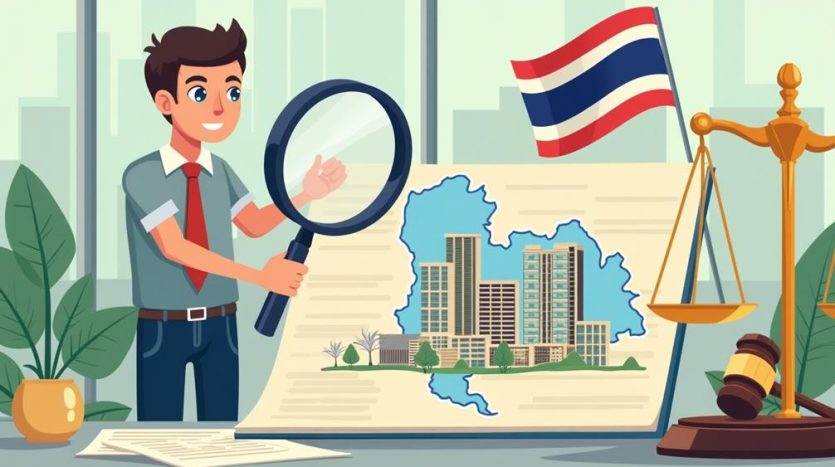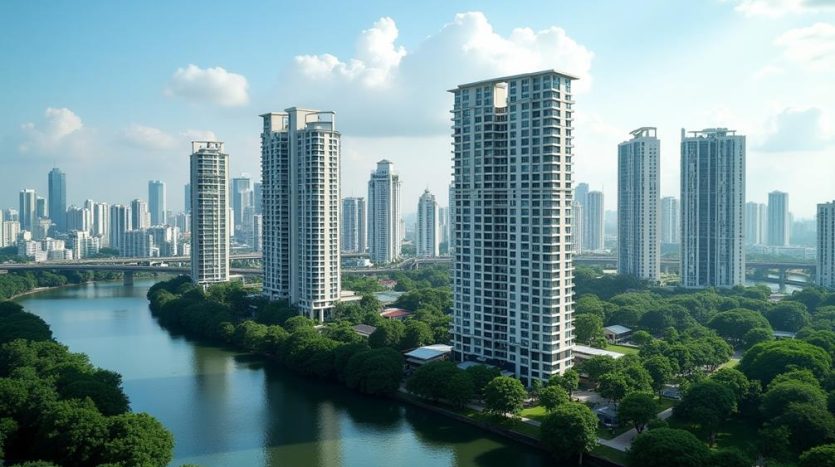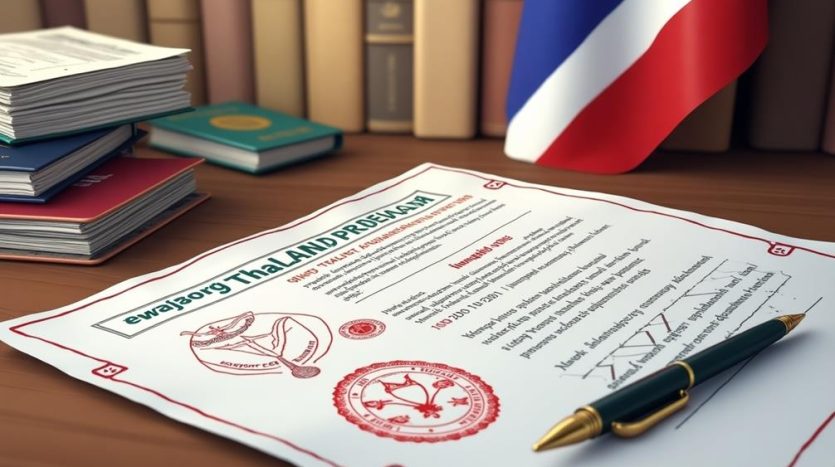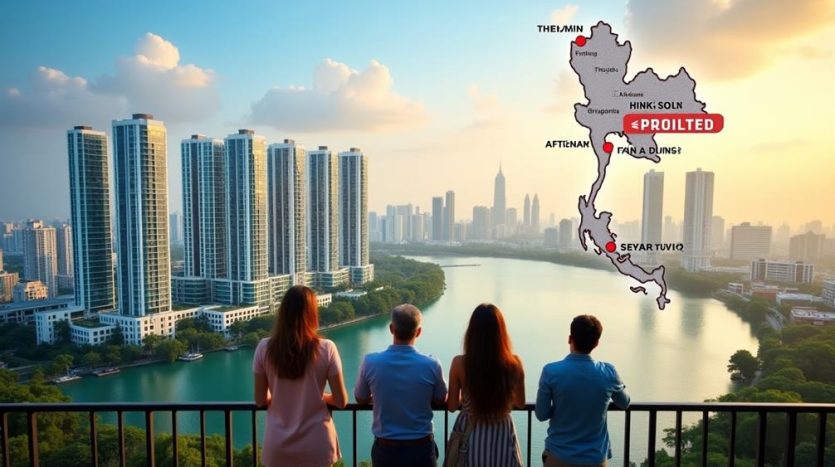How Many Condos Can a Foreigner Buy in Thailand?
Imagine gazing from your potential condo in Thailand, the skyline dotted with possibilities. You might wonder just how many condos you can actually buy as a foreigner. Thailand's laws, particularly the Condominium Act, set specific limits on foreign ownership, allowing you to own up to 49% of the total floor area in any given building. But that's just the surface. To fully grasp the intricacies of these regulations and navigate the legal maze, you'll need to understand the financial and documentation requirements that come with property ownership in Thailand.
Key Takeaways
- Foreigners can own up to 49% of the total floor area in a condominium building.
- Each condo unit must have its title deed registered in the foreign buyer's name.
- Funds for condo purchases must be transferred from abroad in foreign currency.
- Compliance with the Condominium Act, including the 49% ownership limit, is mandatory.
- A Foreign Exchange Transaction Form is required for legal compliance when purchasing.
Understanding Thailand's Property Laws
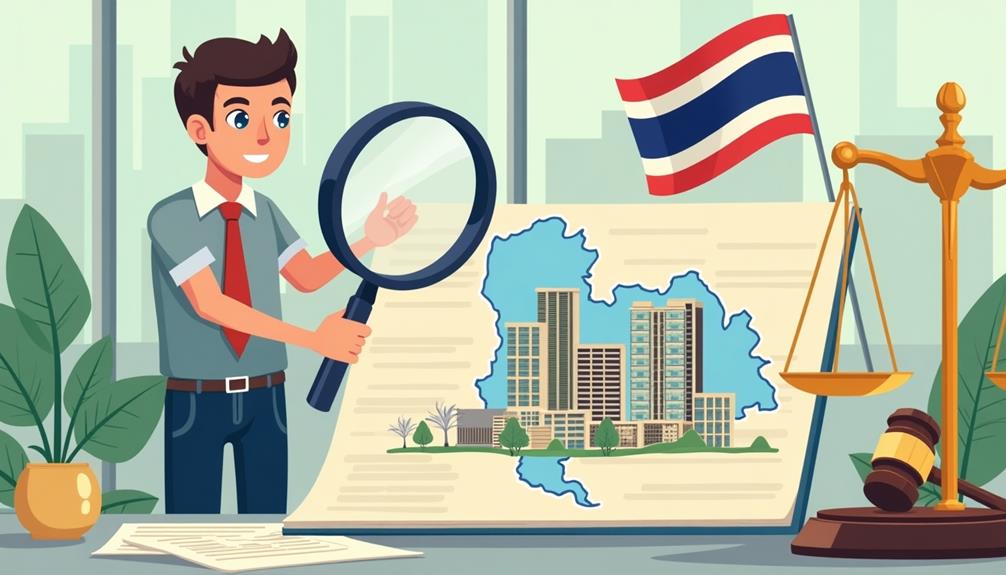
Initially, the ownership structures in Thailand are designed with specific regulations that you must comply with. The purchasing process involves several steps, including due diligence, signing agreements, and guaranteeing regulatory compliance.
You'll find that the legal framework protects both buyers and sellers, but it can seem like a maze without a map. Foreign investors often face unique challenges, such as understanding the allowable ownership percentages and traversing the complexities of the Condominium Act.
Market fluctuations might make you feel like you're on a rollercoaster, but staying informed about investment trends can help you ride the waves smoothly.
It's also essential to verify title deeds to confirm legitimacy and avoid potential disputes.
Foreign Ownership Limits
Foreign Ownership Limits
When it comes to foreign ownership limits in Thailand, you must navigate a specific set of statutory requirements. Under Thai law, foreigners can own up to 49% of the total floor area of all units in a condominium building. This means, if a condo development has 100 units, only 49 of those can be foreign-owned. If you're eyeing the 50th unit, you'll need to rethink your strategy.
Foreigners should also be aware that compliance with Thai property laws is necessary to secure investments.
Foreign ownership regulations are quite clear: the title deed for your condo must be registered in your name, and the funds used for the purchase must be transferred from abroad in a foreign currency. Sounds like a lot of paperwork? It is. But think of it as a bureaucratic jungle gym—challenging yet rewarding.
Foreigner restrictions also stipulate that you must comply with the Condominium Act B.E. 2522. You can't just waltz in and buy up the place like it's a Saturday market.
Additionally, you're required to get a Foreign Exchange Transaction Form from the bank, ensuring every baht traces back to a legitimate source.
Eligible Condo Types
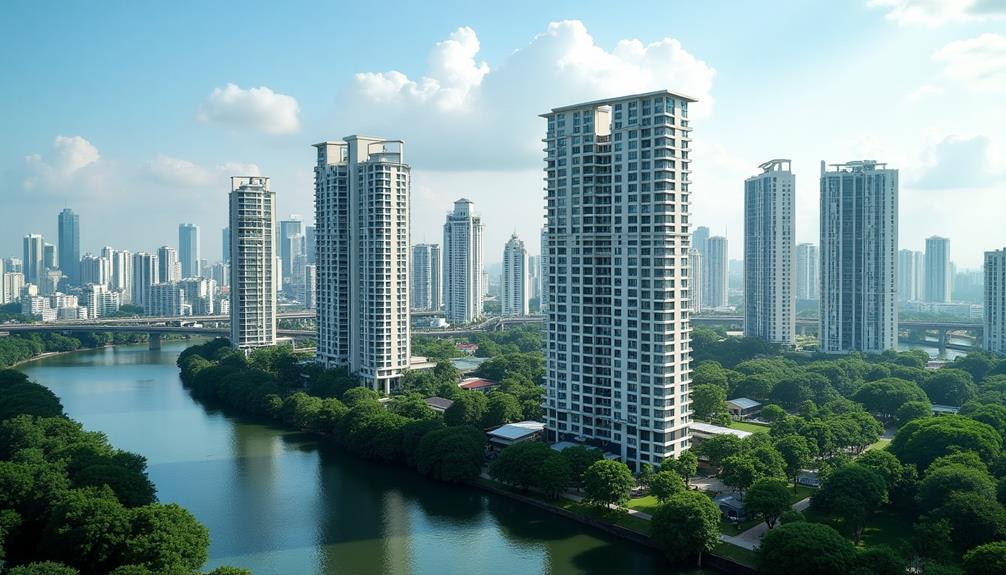
Selecting the right eligible condo type is essential for foreign investors aiming to maximize their return while adhering to Thai regulations. You'll find a variety of options to match your investment goals, ranging from luxury condos and beachfront properties to affordable condos and city apartments. Each type caters to distinct preferences and budgets, so let's break it down.
Luxury condos are your go-to if you seek high-end amenities and a posh lifestyle. Think rooftop pools and concierge services.
Beachfront properties offer stunning views and direct access to Thailand's gorgeous beaches, making them a hot pick for investors targeting vacation rentals.
Affordable condos, on the other hand, are perfect for those looking to enter the market without breaking the bank. Though they lack the bells and whistles of luxury units, they provide solid returns.
City apartments are ideal if you prefer an urban setting, close to work hubs, shopping centers, and vibrant nightlife.
Investment condos are specifically designed for rental income, attracting long-term tenants or tourists.
For those with familial considerations, family condos offer spacious layouts and kid-friendly amenities.
Choose wisely, and you'll make the most of Thailand's lucrative real estate market.
Legal Requirements
Steering through the legal requirements for foreign condo ownership in Thailand is essential to guaranteeing a smooth investment process. You need to know that Thai law permits foreigners to own up to 49% of the total floor area of all units in a condominium building. So, no, you can't buy the whole block and start your empire just yet.
First, verify your foreign investment complies with the Condominium Act, which is the primary legal framework governing condo ownership. This legislation mandates that funds used for the purchase must be transferred from overseas in foreign currency. Simply put, your money needs a passport too.
Next, you must obtain a Foreign Exchange Transaction Form (FETF) from your bank. This form is your golden ticket to legal compliance. Without it, your purchase could be invalidated.
Additionally, confirm the condo project itself is compliant with relevant regulations. Developers must adhere to specific guidelines, such as obtaining proper licenses and confirming the condominium building meets the 49% foreign ownership cap.
Necessary Documentation
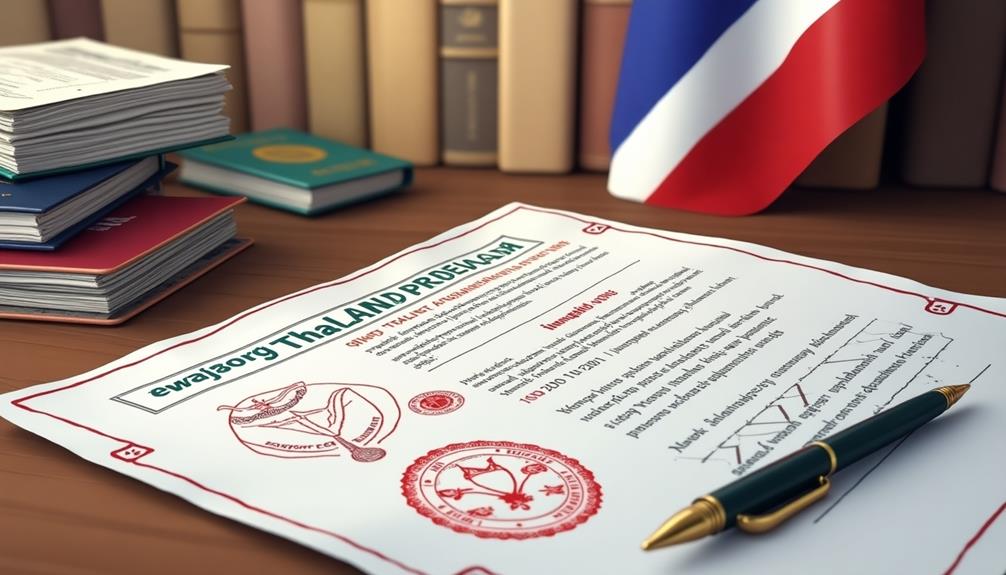
Understanding the intricacies of necessary documentation is essential to guaranteeing your condo purchase in Thailand is legally sound.
First and foremost, you'll need your passport, which must be valid and contain at least six months of remaining validity. Don't worry; no one's asking for your kindergarten report card, just the basics!
The document requirements also include a Foreign Exchange Transaction Form (FETF). This form is a must-have to prove the funds you've brought into Thailand for the condo purchase. Think of it as a financial passport stamp.
To get this, you'll need to make sure your money is transferred from a foreign bank in foreign currency and converted to Thai Baht by a Thai bank.
Next, prepare a copy of the condo's Title Deed (Chanote) and the Sales Agreement.
The application process also mandates a letter from the developer confirming the building's foreign ownership quota hasn't exceeded the 49% limit. Yes, even in paradise, there's fine print.
Financing Options
When considering financing options, you must first understand the loan eligibility requirements which can vary between local and foreign banks.
Local banks typically impose stricter criteria for foreign buyers, while foreign banks may offer more flexible terms.
Additionally, you should assess currency exchange considerations to mitigate potential financial risks.
Loan Eligibility Requirements
Securing financing as a foreigner to purchase a condo in Thailand requires meeting specific loan eligibility requirements. You might think it's as simple as walking into a bank and saying, "I'd like one condo loan, please!" But the reality involves a bit more paperwork and patience.
First, understand the loan types available to you. Generally, you've got personal loans and housing loans. Personal loans offer more flexibility but come with higher interest rates. Housing loans, specifically designed for property purchases, often have more favorable interest rates but stricter eligibility criteria.
Next, scrutinize your financial standing. Banks will assess your credit history, income stability, and existing debts. Proving a steady income is essential, especially if it's from a foreign source.
Don't forget, the required down payment can be hefty—up to 40% of the property's value.
Lastly, brace yourself for the legal jargon. You'll need to show proof of funds being transferred from overseas, adhering to Thailand's Foreign Exchange Transaction Form (FETF) regulations.
In short, while the road to owning a condo in Thailand might be paved with red tape, a bit of due diligence and a sprinkle of humor can make the journey worthwhile.
Local vs. Foreign Banks
Choosing between local and foreign banks for financing your condo purchase in Thailand is a pivotal decision. Local banks often provide more straightforward access, adhering strictly to Thailand's banking regulations. They might offer lower interest rates and a better understanding of local market conditions, but their lending criteria can be stringent, especially for foreigners.
On the other hand, foreign banks bring a sense of familiarity and potentially more flexible lending terms, but they might be more conservative due to perceived risks associated with currency stability in Thailand.
Navigating these options requires you to evaluate your financial profile and risk tolerance. Local banks can sometimes be sticklers for paperwork, and you might find yourself drowning in a sea of forms. However, they often provide better integration with local real estate markets.
Foreign banks, while potentially more lenient with documentation, may impose higher interest rates to hedge against currency fluctuations.
In the end, your choice hinges on balancing regulatory compliance with financial convenience. If you enjoy a good challenge, try deciphering the fine print of local banks. But if you prefer sailing smoother seas, foreign banks might just be your best bet.
Currency Exchange Considerations
Considering currency exchange rates is essential when financing a condo purchase in Thailand. You must navigate the labyrinth of currency fluctuations and exchange rates to avoid unwelcome surprises.
Let's face it, nobody wants to discover that their dream condo is suddenly out of budget due to an unfavorable exchange rate swing.
To mitigate these risks, consider the following:
- Secure a Fixed Exchange Rate: Engage with a financial institution that offers fixed exchange rates to lock in favorable terms.
- Monitor Currency Trends: Keep a close eye on currency markets. Apps and financial news can be your best friends here.
- Diversify Payment Schedule: Spread out your payments over time to average out currency fluctuations.
- Consult Financial Experts: Hire a financial advisor who specializes in international real estate transactions to guide you.
Tax Implications

When purchasing property in Thailand, you must consider the property transfer fees and rental income tax.
These financial obligations can greatly impact the overall cost and income potential of your investment.
Understanding these tax implications is essential for compliance and financial planning.
Property Transfer Fees
Steering through the intricacies of property transfer fees in Thailand is essential for foreign investors. When you initiate the transfer process, you'll encounter several fees tied to the property valuation. These fees can greatly impact your final costs, so understanding them is vital.
Firstly, the transfer fee stands at 2% of the appraised property value. This fee is non-negotiable and must be paid at the Land Office during the transfer process.
Next, there's the specific business tax, levied at 3.3% of the appraised value or selling price, whichever is higher. This tax applies if the property is sold within five years of purchase.
Additionally, stamp duty is 0.5% of the registered sale value, but it's only applicable if the specific business tax doesn't apply.
Finally, the withholding tax, calculated at a progressive rate based on the property's appraised value, is another key consideration.
Keep in mind:
- Transfer Fee: 2% of appraised property value
- Specific Business Tax: 3.3% of appraised value or selling price
- Stamp Duty: 0.5% of registered sale value
- Withholding Tax: Progressive rate based on property valuation
Navigating these fees can feel like deciphering an ancient script, but they're integral to the property transfer process in Thailand.
Rental Income Tax
Understanding rental income tax implications is vital for foreign investors who plan to lease out their properties in Thailand. You'll need to traverse the labyrinthine world of tax regulations, but fear not—it's not all doom and gloom.
First, know that rental income is taxable. That means any rent collected is subject to taxation under Thai law.
Now, let's spice things up with tax deductions. Yes, deductions are your friend here. You can deduct maintenance costs, property management fees, and even depreciation. These deductions can greatly reduce your taxable rental income, leaving more baht in your pocket.
The tax rate on rental income varies, typically ranging from 5% to 35%, depending on your total annual income. Filing your taxes correctly is vital to avoid penalties. And let's be real, no one wants to tango with the Thai Revenue Department.
Lastly, don't forget the double tax agreements between Thailand and your home country. These agreements can help you avoid being taxed twice on the same income.
Investment Strategies
Investing in Thai condominiums can often be a lucrative opportunity for foreigners, provided they adhere to the legal constraints and market conditions.
To maximize your investment returns, you'll need to stay informed about market trends and employ effective strategies. For instance, understanding the cost-effective transportation options can help gauge the attractiveness of a location to potential renters.
Additionally, knowing that healthcare costs are affordable with insurance plans between $500 and $2,000 annually can highlight the overall cost-effectiveness of living in Thailand.
Here are a few key tactics:
- Local Market Analysis: Regularly monitor market trends to identify high-demand areas and emerging neighborhoods. This will inform your purchasing decisions.
- Property Management: Consider hiring a professional property management company. They can handle day-to-day operations, ensuring your investment remains profitable without you lifting a finger.
- Long-term Investment: Thai real estate generally appreciates over time. Focus on long-term gains rather than quick flips to benefit from the steady increase in property values.
- Diversification: Don't put all your eggs in one basket. Spread your investments across multiple properties and locations to mitigate risk.
Common Pitfalls

While employing effective investment strategies can greatly enhance your returns, it's equally important to be aware of common pitfalls that could jeopardize your financial goals. As a foreign investor, you face unique challenges in the Thai property market. One major pitfall is failing to understand the 49% foreign ownership limit in condominiums. Exceeding this threshold can render your purchase invalid, leaving you in a legal quagmire.
Furthermore, property market trends in Thailand can be volatile. Ignoring these trends could lead you to invest in overvalued properties, resulting in diminished returns. Another trap is neglecting due diligence. Always verify the developer's track record and the project's legal status. Overlooking these aspects might leave you with an unfinished or legally compromised condo.
In addition to these challenges, it's important to reflect on local amenities and community support, which can greatly influence property values and rental potential. Failing to account for these factors might lead to a less appealing investment.
Additionally, currency fluctuations pose another risk. Sudden changes in exchange rates can greatly affect your investment's value. It's wise to seek financial advice to mitigate this risk.

